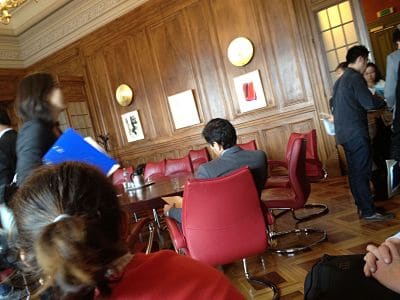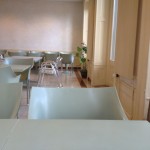During treaty body sessions at the Palais Wilson one of the undoubted ‘hotspots’ for action is the cafeteria located on the first floor opposite to the Conference room where the formal proceedings take place. During sessions there is always plenty of action in the café: as soon as it opens, the first visitors make their way in either in search of their daily pick-me up also known as coffee, or with other missions in mind, such as holding informal meetings. Indeed, in addition to the steady flow of staff members from the UN Secretariat, one can almost always spot small gatherings of people seated at the tables overlooking the lake and discussing matters of importance in semi-hushed tones. It is also in the cafeteria that one can trace important links between different actors and individuals related to the Session.
I find myself making regular notice of the surprisingly high frequency that the young, charismatic head of an NGO, a Geneva based umbrella organisation for which I shall use the pseudonym ‘CoORDINATE’, visits the cafeteria; my impression that he is in good terms with the Secretariat is certainly backed up his recurring café accompaniments who include both members of the Committee and staff from the secretariat.
During lunch hour the cafeteria fills to the brim as people swarm in both from the Conference room where the different UN Committees meet as well as the upper floors from the Secretariat. Yet despite the initial impression that this leads to random seating arrangements, after only a few days also the casual observer
begins to see clearly defined patterns of who sits together: treaty body members form commonly parties of their own, as do members of the secretariat and NGOs, and still an entirely different category is formed by the large numbers of interns working both at the Secretariat and with individual treaty body members. After a week or so these patterns appear to grow surprisingly systematic, and it remains impossible to not to connect them to more general findings of the internal societal structures of treaty bodies and the secretariat.

The NGO coalition in question was gathered at the centre of the room located by the Lac Léman, and they spoke of the proceedings with exhausted enthusiasm – apparently the previous night had been a long one as numerous coalition members noted that they had stayed up until the small hours of the morning to polish the follow-up questions they presented to the Committee this morning. That the questions were, in fact, not picked-up by treaty body members in the formal proceedings between the Committee and the state delegation was neither surprising nor problematic to seasoned NGO coalition members; they noted to others who had brought up this observation that the questions would in any event be recorded in the electronic minutes of the meeting. Thus these questions had succeeded in making the desired impact into the proceedings accompanying the submission state report as desired by these NGOs.
The NGO coalition was impressive in size: it consisted of close to 15 individuals almost all of whom had travelled to Geneva exclusively for these proceedings.
A seasoned delegate member noted with distinct pride that all of the travel costs of delegation participants had been paid by the NGOs themselves, and that they had not received funding from any external source. The delegate member continued by highlighting how UN treaty body members always took note of the sizeable presence of the NGO delegation from their country, and how this was a key signal for treaty body members of how NGOs challenged the data offered by the state in treaty body proceedings.
That the previous night had run late manifested itself in the general atmosphere of the meeting: some delegate members were visibly exhausted, silent and looking a bit pale, whereas others were evidently hyper-active, as if intoxicated from the combination of insomnia and global reform. A leading senior delegate member, who embodied this cocktail most visibly, joked how he had actually fell asleep during the closing statement of the state delegation; he said that he had only snoozed off for five minutes or so, but others corrected that his nap had, in fact, lasted much longer.
After these pleasentries the groups grows more organised, and discussions turned to the issue of a press release – how should it be formulated to attract the most press attention back home? This issue was of no minor importance; just a moment earlier another senior delegate member had complained how difficult it was to get the press to pay any attention to treaty body proceedings occurring so far away. To this senior treaty body member awakening public opinion was, however, one of the prime tasks of NGO involvement in the proceedings. As the coalition began discussing the content of the press release, the atmosphere became instantly charged: any signs of sleep-deprivation was pushed to the background as participants started to debate the various avenues available to them. At first it was proposed that the press release would focus on 6 key problem areas identified by NGOs in their pre-presentation summary to the treaty body in the informal NGO meeting which had taken place, as was customary, on the day prior to the presentation of the state, in the latter part of the two-hour lunch break. In the informal NGO meeting the coalition had, again in manner customary to these hearings, presented a summary of their primary points. This occasion was always highly important precisely due to the fact that in the program of the Committee the informal NGO meeting was placed prior to the formal presentation by states.
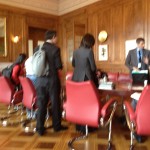
After this representatives of individual NGOs began to address treaty body members with their concerns. These individual presentations revealed that all the NGO delegates were well versed in the practices characterising NGO hearings at the UN: time is short, issues are vast and there exists only one opportunity to impress treaty body members. As before, the main goal of NGO members remained catching the attention of treaty body members through issues that they could then instantly take up in the following session in the ‘constructive dialogue’ in between the Committee and the state party. In this attempt NGO delegates demonstrated full awareness of the techniques that were required; as a general rule, one needs to penetrate through the composed figures of engaged-disengaged treaty body members who are clearly over-burdened by the tasks facing them during the course of the intense treaty body session weeks.
In the individual NGO presentations that followed, two techniques proved most effective: either precise, and shocking statistical detail, or touching, and equally shocking, personal histories. Of personal histories the most successful narratives became the story told in the first person by a young, articulate delegate participant who brought up breaches of privacy by officials. He told how he had discovered that his email account had been hacked into, and recounted how slow the police had been in investigating the issue. After close to 6 months of investigation, the story continued, the police had stated that they had located this instance of hacking to a machine/automat – which in turn was connected to yet another machine. At the end, the delegation member shared, the police had effectively proposed to him that he leave any further investigations alone. The delegate member employed this personal history further to illustrate how he suspected that such invasions of privacy were utilised by the authorities to target NGO activists and thus to encourage them to restrict their actions.
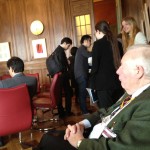
I returned to this figure during a momentary pause in the gathering at the cafeteria, asking if the delegate member had been satisfied with the proceedings, and further, whether this figure had found satisfactory ‘life’ in the exchange between treaty body members and state delegates. The NGO representative said, still clearly pleased, that this number had indeed been brought up, and that, quite predictably, the state delegation had dismissed of the figure pleading to some policy guideline or statistical detail instead. Still, the figure introduced by the NGO informal meeting had found its way into the ‘constructive dialogue’, and become embodied in the official Committee minutes. That the state delegation had contested the figure mattered little; it was an expected move for the NGO delegations which in no manner challenged the legitimacy of the NGO presentation in the eyes of the Committee.
Discussions at the cafeteria became increasingly intense as delegate members exchanged views on the content of the press release. A junior participant proposed organising the proposed issues into thematic clusters according to the relevant provisions of the CCPR they addressed – a proposal that was quickly dismissed as more seasoned participants pointed out that such an approach would most certainly not manage to capture the attention of the press. A few members proposed that the press release should merely enlist all the concerns raised by NGOs that remained without satisfactory response from the state delegation; the junior delegation member keeping minutes counted this number of issues to total nine. Also this proposal was vetoed by a more seasoned participant, who instead proposed limiting the number of issues to four. The delegate member emphasised that if the NGO delegate wished to capture the attention of the press, they should, in fact, consider the functioning logic of the press and keep their list of issues both clearly focused as well as restricted in numbers.
Another delegation member went even further, proposing first that the press release would only focus on two issues – universal suffrage being one of them – and yet another proposal took the process of simplification a step further still, proposing that the entire statement would be drafted around the issue of universal suffrage. Both of these proposals were again rejected as they were seen, by contrast, as being overly simplistic. Discussions then highlighted the prospect of issuing two separate press releases: first, an immediate reaction to highlight the major issues at stake, the question of universal suffrage being a priority, and then a more expansive one a few days later including a fuller list of concerns.
However, also this proposal was opposed as it contrasted with coalition plans to organise a press meeting – all those present agreed that calling this meeting a ‘press conference’ would have been grossly exaggeration; by any realistic measures press interest was limited, and any participant from the press would be small. However, ironically this sentiment was momentarily contrasted by the simultaneous call for an interview as one delegation member, an otherwise silent participant in the lunch gathering, called out to others “would any one be available to do an interview with Today now?” The summary of this exchange became that if the initial press release would be followed-up by yet another, more detailed statement, press representatives would be even less likely to attend any concrete event organised on the proceedings. Since the organisation of a ‘press meeting’ upon returning from Geneva appeared to form another priority for the NGO delegation, the consensus of those present at the lunch meeting was that this outcome was to be avoided.
After all of these discussions a compromise was reached: selected members of the delegation would draft a statement which would then be distributed to the media during the same afternoon, after which, likely in a few days, any interested NGOs would issue separate, more concretely focused statements and also distribute them separately. This decision was followed by reorganisation as a few delegation participants moved to a near-by table to begin concrete work on the press release. The rest of the delegation remained seated around the joint table, and became immersed in their range of impressive portable devises from the latest iPads to other sophisticated tablet computers; although still in positive spirits, the exhaustion of the past few days was becoming more visible with each passing minute. Discussions also emerged on details for return journeys. Many would be staying in Geneva for one or two more days before returning back home – expect for one well-dressed and articulate young delegate participant who, the others informed, was placed in London.
Soon this experience would thus be over, and all the zealous activity accompanying the presentation of yet another report would be a mere memory. Yet, these moments would not seize existing all-together, but instead become joined in the long chain of similar instances through which NGOs continually reinforced their status as the legitimate voice of their populations, challenging the smooth narratives put forth by their respective governments. Although the NGOs in attendance were all focused and operated in their country of origin, many delegate participants were regular visitors to the treaty body system, and they would again return in the not too distant future when the next report by their state of origin was due for a UN body. Seasoned delegate participants reinforced this sentiment by brief recollections of appearances before other UN treaty bodies in previous hearings, and jointly this duality of both the past and the future to come effectively connected this otherwise isolated instance into a larger ongoing trajectory of political activism.
Slowly the discussion started to die down, and the only thing remaining was the finalising of the press release to be distributed in the hours to come. Throughout this meeting, primarily occurring in audible voices and also heated exchanges, treaty body members had been seated in tables neighbouring the NGO delegation on all sides. Neither the NGO members nor the delegate members made any attempts at direct communication across the tables; perhaps they did not even recognise each other – after all, during the proceedings NGO representatives are systematically seated at the back while treaty bodies are seated at the front. For treaty body members this fact was almost certain: given the incredible intensity of faces they encountered during the fully-packed session weeks it would become borderline impossible to expect them to recognise the ever-changing faces around them that they, at best, had exposure for a few hours.
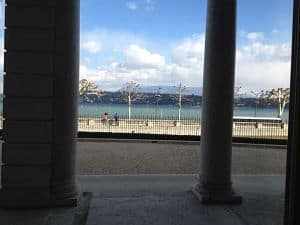
More fieldnotes here. See also Miia Halme-Tuomisaari, ‘Contested Representation: Exploring China’s State Report’ (Journal of Legal Anthropology 2013)

